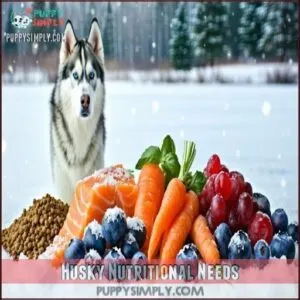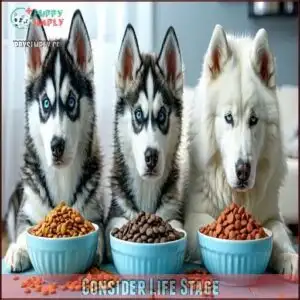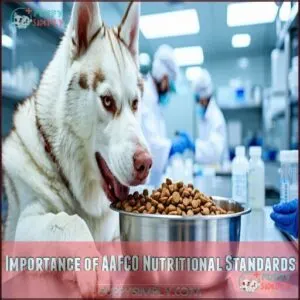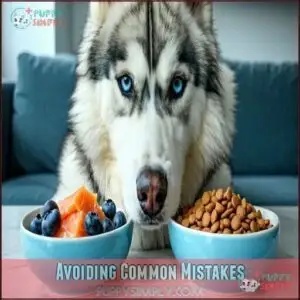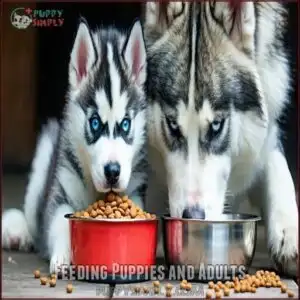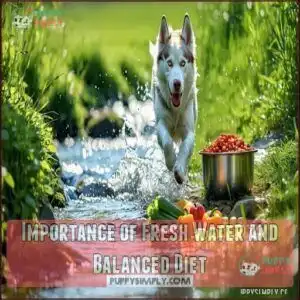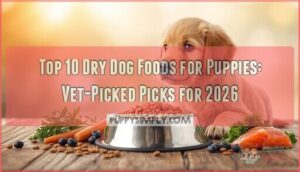This site is supported by our readers. We may earn a commission, at no cost to you, if you purchase through links.
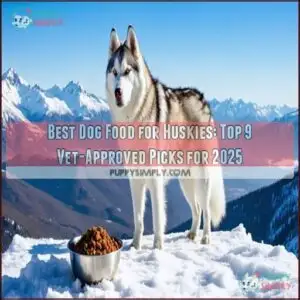
Look for options with quality animal proteins listed first and about 20% healthy fats for their thick coat. Top choices include Diamond Naturals Large Breed, Wellness Complete Health, and Orijen Puppy for growing huskies.
You’ll want foods with omega fatty acids to keep that stunning coat gleaming and joints healthy. Avoid fillers like corn and wheat that don’t offer much nutrition.
Feed according to your husky’s activity level—these snow-loving athletes burn calories differently than other breeds. The right formula makes all the difference between a healthy husky and an expensive vet bill.
Table Of Contents
- Key Takeaways
- Husky Nutritional Needs
- Husky Health Considerations
- Choosing Best Dog Food
- Top 9 Best Dog Foods
- 1. Diamond Naturals Large Breed Chicken Dog Food
- 2. Wellness Complete Health Chicken Oatmeal Dog Food
- 3. Nutro Ultra Adult Weight Management Dog Food
- 4. Merrick Salmon Brown Rice Dog Food
- 5. Acana Grasslands Lamb Duck Dog Food
- 6. Instinct Grain Free Rabbit Dry Dog Food
- 7. Solid Gold Wolf King Large Breed Dog Food
- 8. Stella Chewy’s Chicken Freeze Dried Dog Food
- 9. Orijen Puppy Grain Free Dog Food
- Husky Life Stage Nutrition
- Avoiding Common Mistakes
- Transitioning to New Food
- Feeding Guide
- Frequently Asked Questions (FAQs)
- What is the best dog food for Huskies?
- What dog food does a Siberian Husky eat?
- What should a Huskie eat?
- How do I make food choices for my husky?
- What makes a Siberian Husky a good dog?
- Can Huskies eat high-protein dog food?
- What is the best dog food for huskies?
- What are Siberian Huskies favorite food?
- Do huskies like dry or wet food?
- What type of food is best for huskies?
- Conclusion
Key Takeaways
- You’ll need to feed your husky high-protein dog food (24-32%) to support their active lifestyle, with quality animal proteins listed first and about 20% healthy fats for their thick coat.
- Your husky requires omega fatty acids to maintain their stunning coat and support joint health, while avoiding fillers like corn and wheat that provide little nutritional value.
- You should adjust your feeding amounts based on your husky’s specific activity level, as these athletic dogs burn calories differently than other breeds and have changing nutritional needs throughout their life stages.
- You’ll want to transition to new foods gradually over 7-10 days to prevent digestive issues, monitoring for any adverse reactions and consulting with your veterinarian for personalized guidance.
Husky Nutritional Needs
Huskies need food that matches their energy and supports their active lifestyle. A balanced diet with the right proteins, fats, and nutrients guarantees their health at every life stage.
Life Stage Considerations
Husky nutrition changes with age.
Puppies need balanced calcium to prevent hip issues and energy-packed husky puppy food.
Adults thrive on diets adjusted for activity, focusing on adult husky food.
Seniors benefit from high protein but lower calories like senior husky food for joint care.
Pregnancy needs demand increased calories to support growth.
- Puppies: Growth-focused diets
- Adults: Activity-based nutrition
- Seniors: Joint care diets
- Pregnancy: Energy-rich foods
Protein Requirements for Muscle Maintenance
To keep your Husky strong and active, their muscle maintenance relies on high protein dog food with quality protein sources.
Look for muscle-building food rich in amino acids and high protein content.
Avoid muscle wasting by choosing options with excellent digestibility factors.
Essential amino acids are essential for building muscle.
Adjust protein requirements based on activity levels to match their energetic needs and support healthy, lean muscles.
Importance of Omega-3 and Omega-6 Fatty Acids
Regarding your Husky’s well-being, omega-3 and omega-6 fatty acids do wonders.
They promote skin and coat health, reduce inflammation, and support joint health.
Coat health food with fish-based proteins or fish oil enhances shine and reduces itching.
These fatty acids also contribute to brain development, keeping your furry friend sharp and active, and it is crucial to prioritize these nutrients daily!
Husky Health Considerations
Keeping your Husky healthy means understanding their unique needs and potential health concerns. From food allergies to joint and digestive problems, choosing the right diet can help prevent common issues.
Food Allergies and Intolerances
Food allergies in Huskies, often triggered by common allergens like chicken or wheat, can cause itchy skin, ear infections, or digestive troubles.
Ingredient sensitivity can worsen with prolonged exposure. Elimination diets help pinpoint culprits by reintroducing proteins gradually.
Look for allergy-friendly food or sensitive stomach food to ease symptoms. A vet consultation is key for managing grain sensitivities and ensuring safety.
Dental Disease and Digestive Issues
Gum health is critical to preventing dental issues like plaque buildup.
Dental chews can help reduce tartar and freshen breath.
Digestive health matters too—probiotics benefits and fiber importance can’t be ignored.
Soft food or limited ingredients work best for sensitive stomach food needs.
Allergy-friendly food prevents flare-ups, supporting digestive issues prevention while keeping your Husky happy and healthy.
Joint Health and Mobility
Strong joints are essential for Huskies to stay active. Joint health food and mobility supplements, like glucosamine and chondroitin, support cartilage and reduce inflammation.
A balanced diet can provide improved joint health.
Here’s how to keep joints healthy:
- Add glucosamine benefits through supplements.
- Focus on Chondroitin sources for cartilage repair.
- Opt for weight management to reduce joint stress.
- Make certain regular exercise impact for mobility.
Choosing Best Dog Food
You need to match your Husky’s food to their age, activity, and health needs. Always pick options that meet AAFCO standards for balanced nutrition.
Consider Activity Level
Active Huskies burn a lot of energy. A high-energy diet like working dog food fits their active lifestyle.
Couch-loving ones need fewer calories. Breed tendencies show balancing energy expenditure is key.
Adjusting portions helps fit their performance diets. For active breeds, consider high protein options to fuel their muscles.
Check this table below for clarity:
| Activity Level | Food Type | Portion Size |
|---|---|---|
| Active | High-energy diet | Larger portions |
| Moderate | Best dog food for Huskies | Standard portions |
| Low | Lower-calorie diet | Smaller portions |
The key to managing their diet is understanding their energy expenditure and adjusting food portions accordingly, ensuring they receive the right amount of calories for their high-energy needs.
Consider Life Stage
Picking the best dog food for Huskies means tailoring it to their life stages.
Puppies need nutrient-packed food for growth, while adults thrive on balanced diets for maintenance.
Seniors benefit from lower calories and joint support.
Pregnancy diets require higher protein for development.
A proper stage shift guarantees your Husky stays healthy, no matter if they’re a puppy, adult, or senior, with a balanced diet.
Importance of AAFCO Nutritional Standards
When choosing the best dog food for huskies, look for AAFCO standards. These guarantee the food meets your Siberian Husky’s nutritional needs with ingredient quality assurance and guaranteed analysis interpretation.
Check the packaging for nutritional adequacy claims under state feed regulations.
- Foods with AAFCO protein standards support muscle health.
- Nutrient levels align with Husky life stages.
- Proper calcium confirms bone development, which is crucial for bone health.
Top 9 Best Dog Foods
Choosing the right food for your Husky is important to keep them healthy and active. Here are nine top-rated options that meet their unique nutritional needs.
1. Diamond Naturals Large Breed Chicken Dog Food
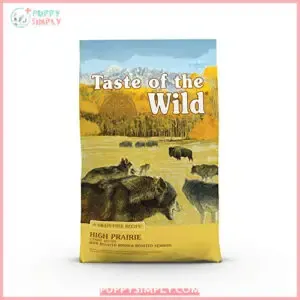
Diamond Naturals Large Breed Chicken Dog Food is a solid choice for your Husky’s health.
It features fresh chicken as the top ingredient, providing high-quality protein for lean muscles. Whole grain brown rice and barley add energy-boosting carbs, while glucosamine and chondroitin support joint health.
Superfoods like spinach and blueberries deliver essential vitamins, and probiotics aid digestion. This formula meets AAFCO standards, making it suitable for all life stages.
Affordable and packed with benefits, it’s ideal for active Huskies needing balanced nutrition.
Best For: Active Husky owners seeking an affordable, balanced, and nutrient-rich dog food suitable for all life stages.
- High-quality protein from fresh chicken supports lean muscles.
- Glucosamine and chondroitin enhance joint health.
- Probiotics improve digestion and immune function.
- May not be ideal for dogs with grain sensitivities.
- Some dogs experience digestive issues like diarrhea.
- Mixed reviews on palatability, as some dogs refuse to eat it.
2. Wellness Complete Health Chicken Oatmeal Dog Food
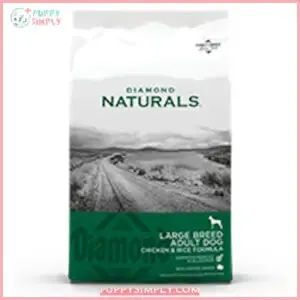
Wellness Complete Health Chicken Oatmeal Dog Food is a balanced choice for Huskies.
Made with deboned chicken and oatmeal, it offers protein and carbs for energy. Omega fatty acids keep your Husky’s coat shiny, while antioxidants support their immune system.
It avoids fillers, artificial preservatives, and GMOs, ensuring clean nutrition. This formula also promotes digestion and joint health with probiotics and glucosamine.
Perfect for active adult Huskies, it provides the nutrients they need to stay healthy and strong.
Best For: Active large breed adult dogs needing balanced nutrition for lean muscles, joint support, and overall health.
- High-protein formula made with cage-free chicken and no artificial additives.
- Contains glucosamine, probiotics, and omega fatty acids for joint, digestive, and coat health.
- Subscription options and affordability increase convenience and value.
- Not suitable for small breed dogs or puppies.
- Limited bag sizes may not suit households with multiple large dogs.
- Contains grain, which some dogs might be sensitive to.
3. Nutro Ultra Adult Weight Management Dog Food
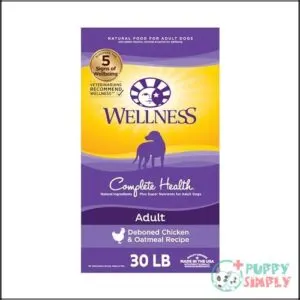
For Huskies needing weight management, Nutro Ultra Adult Weight Management Dog Food is an excellent choice.
With chicken as the first ingredient, it provides high-quality protein to support muscles.
Oatmeal aids digestion, while antioxidants boost the immune system.
Omega fatty acids keep your dog’s coat shiny and healthy.
It’s crafted with non-GMO ingredients and avoids artificial additives like corn or soy.
Plus, its trio of proteins—chicken, lamb, and salmon—offers balanced nutrition.
This kibble helps keep your Husky’s weight and health on track.
Best For: Adult dogs, especially those needing weight management and a balanced, protein-rich diet.
- Made with high-quality protein sources like chicken, lamb, and salmon.
- Features non-GMO ingredients with no artificial additives or common allergens.
- Includes omega fatty acids, antioxidants, and probiotics for overall health.
- May be more expensive compared to standard dog food options.
- Not suitable for dogs with specific protein allergies.
- Limited availability in smaller, local stores.
4. Merrick Salmon Brown Rice Dog Food
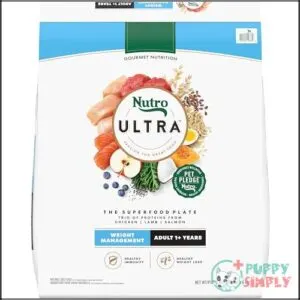
Merrick Salmon Brown Rice Dog Food gives your Husky balanced nutrition with real salmon as a protein-packed base.
With brown rice and oats, it’s easy on the stomach while delivering energy. This formula avoids common allergens like soy, corn, and peas, making it perfect for sensitive digestive systems.
Packed with omega fatty acids, it supports a shiny coat and healthy skin. Plus, glucosamine and chondroitin keep joints in good shape.
It’s a reliable, health-focused choice for adult dogs needing quality care.
Best For: Adult dogs of all breeds and sizes with sensitive stomachs or joint health needs.
- High-quality salmon as the main protein source.
- Free from common allergens like soy, corn, and peas.
- Includes glucosamine and chondroitin for joint support.
- Limited to adult dogs, not suitable for puppies or seniors with specific needs.
- May not appeal to dogs who dislike fish-based flavors.
- Higher price point compared to some other dog food brands.
5. Acana Grasslands Lamb Duck Dog Food
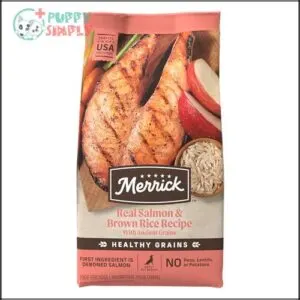
Acana Grasslands Lamb Duck Dog Food is crafted with premium animal proteins like lamb, duck, and cage-free eggs, making it a top choice for active Huskies.
The first three ingredients are fresh or raw, ensuring natural nutrients. It’s grain-free and free from soy, corn, wheat, or tapioca, ideal for sensitive stomachs.
Coated with freeze-dried lamb and duck liver, it’s designed to please even picky eaters. Plus, added prebiotics and fiber boost digestion, making it a nutritious, easily digestible option for Huskies.
Best For: Active Huskies with sensitive stomachs or picky eating habits who need a grain-free, high-protein diet.
- High-quality animal proteins like lamb, duck, and cage-free eggs support active lifestyles.
- Freeze-dried lamb and duck liver coating enhances taste and appeals to picky eaters.
- Includes prebiotics and fiber for improved digestion and stomach health.
- May not be suitable for dogs requiring grain-inclusive diets.
- Premium ingredients make it more expensive than average dog foods.
- Limited ingredient variety may not cater to all dietary preferences or sensitivities.
6. Instinct Grain Free Rabbit Dry Dog Food
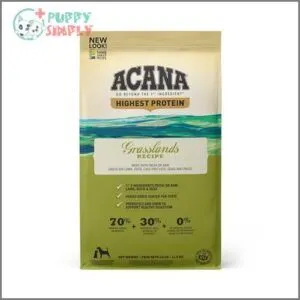
Instinct Grain Free Rabbit Dry Dog Food is a great choice for Huskies with food sensitivities.
Its high protein content comes from farm-raised rabbit, making it ideal for building strong muscles. The recipe is grain-free and gluten-free, supporting dogs with sensitive stomachs.
Added probiotics improve digestion, while omega fatty acids promote a shiny coat.
With no artificial additives, it’s minimally processed and features a freeze-dried raw coating for flavor.
This nutrient-rich option works best when gradually introduced to your Husky’s diet.
Best For: Huskies with food sensitivities needing a high-protein, grain-free diet.
- High protein content from farm-raised rabbit supports strong muscles.
- Contains probiotics and omega fatty acids for digestion and coat health.
- Minimal processing with a freeze-dried raw coating for enhanced flavor.
- High protein content may not suit all dogs.
- Grain-free diet may not be necessary for all Huskies.
- Gradual introduction is required to avoid digestive upset.
7. Solid Gold Wolf King Large Breed Dog Food
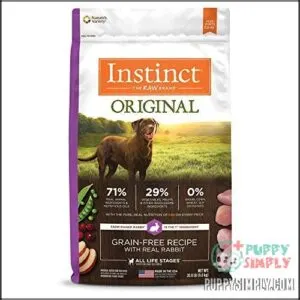
Solid Gold Wolf King Large Breed Dog Food is a great choice for active Huskies.
Its high-protein kibble, coated with freeze-dried raw chicken, provides balanced nutrition.
This grain-free formula promotes digestion with probiotics and nourishes skin and coat with omega fatty acids.
Made with real meat and whole food ingredients, it’s free from artificial additives, making it ideal for sensitive stomachs.
Designed for large breeds, it supports muscle maintenance and overall health.
Produced in the USA, it’s a premium, nutrient-dense option.
Best For: Active large breed dogs, including Huskies, needing high-protein, grain-free, and minimally processed nutrition.
- Promotes healthy digestion with added probiotics.
- Supports skin and coat health with omega fatty acids.
- Made with natural, high-quality ingredients and no artificial additives.
- Requires proper storage to maintain freshness of raw-coated kibble.
- Premium price may not suit all budgets.
- May not be suitable for dogs with specific protein sensitivities.
8. Stella Chewy’s Chicken Freeze Dried Dog Food
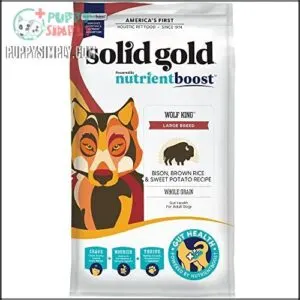
Stella & Chewy’s Chicken Freeze-Dried Dog Food combines convenience and high-quality nutrition.
Made with real chicken, ground bone, and wholesome ingredients like pumpkin seed and cranberries, it delivers balanced meals for your Husky.
Freeze-dried to lock in nutrients, it’s easy to store and ideal for sensitive stomachs.
With 33% protein and omega-3 fatty acids, it supports muscle maintenance, coat health, and overall well-being.
Free of fillers like corn, wheat, and soy, it’s a healthy, allergen-friendly option your dog will love, providing high-quality nutrition.
Best For: Owners of large breed dogs, especially those with sensitive stomachs or food allergies, looking for a high-protein, nutrient-rich, allergen-friendly diet.
- High protein content supports muscle health.
- Free of common allergens like corn, wheat, and soy.
- Freeze-dried for easy storage and nutrient retention.
- Higher price point compared to standard dog food.
- Not ideal for small breeds due to tailored large breed formula.
- Requires gradual transition to avoid digestive upset.
9. Orijen Puppy Grain Free Dog Food
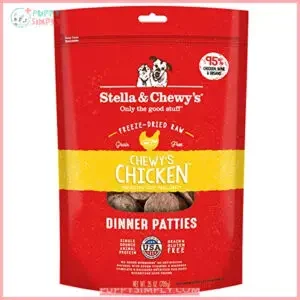
Orijen Puppy Grain Free Dog Food is perfect for your Husky puppy’s growth.
Packed with 85% premium animal ingredients like free-run chicken, turkey, and wild-caught fish, it delivers high protein and healthy fats to support peak development.
Regional fruits and vegetables provide essential vitamins and minerals, ensuring balanced nutrition.
This recipe meets AAFCO standards for large breeds, making it ideal for puppies over 70 pounds as adults.
It’s grain-free and formulated to fuel energy and promote strong bones and lean muscles.
Best For: Puppies, especially large breeds like Huskies, requiring high protein and balanced nutrition for growth.
- Contains 85% premium animal ingredients for optimal development.
- Includes a variety of regional fruits and vegetables for essential vitamins and minerals.
- Grain-free recipe designed to support strong bones and lean muscles.
- May not suit dogs with specific protein allergies.
- Higher cost compared to some other puppy foods.
- Limited carbohydrate content might not suit all dietary needs.
Husky Life Stage Nutrition
A Husky’s nutritional needs change as they grow, so choosing the right food for each life stage is key to their health.
Puppies, adults, and seniors all require specific diets to support their development, activity, and overall well-being.
Puppy Nutrition for Growth and Development
Growing Huskies need specialized puppy nutrition to fuel healthy bone development and growth.
Fuel your Husky puppy’s growth with tailored nutrition for strong bones, vibrant energy, and a healthy start to life.
Quality protein sources like chicken or fish, omega fatty acids for coat health, and controlled calcium levels are essential. High calories support their active nature.
Aim for brands like ORIJEN Puppy, packed with nutrients for puppy development, before safely switching to adult food at 12 months.
Consider options for specific husky breeds to promote optimal health.
Adult Nutrition for Maintenance and Health
Your Husky’s active lifestyle calls for a balanced diet to keep them strong and energetic.
Choose foods designed for adult Huskies with moderate calories and high protein content. Look for options that support coat health and weight management.
To find the best options, consider where to purchase proper nutrition.
Prioritize these for a proper adult Husky diet:
- Protein: Real meat like chicken or fish as the first ingredient.
- Dietary Fiber: Promotes digestion and energy stability.
- Healthy Fats: Omega-3 and omega-6 for skin and coat health.
Senior Nutrition for Joint Health and Mobility
Senior Huskies need special care to stay active.
Choose senior husky food rich in glucosamine and chondroitin for joint health. Omega-3s reduce inflammation, easing mobility.
Balanced weight management supports aging joints, while gentle senior exercise maintains strength. Prioritize nutrient-dense meals designed for slower metabolisms.
Focus on ingredients that improve flexibility and protect joints, ensuring comfort and longevity. Some foods also include yucca schidigera extract for relieving pain.
Avoiding Common Mistakes
Feeding your Husky the wrong food or portion sizes can lead to health problems like obesity or malnutrition. Understanding common mistakes helps you make better choices for their long-term health.
Avoiding Overfeeding and Obesity
To avoid overfeeding your Husky, focus on portion control and stick to a feeding guide.
Check labels to match calorie needs, and opt for weight management food if needed.
Regular exercise is key to obesity prevention and keeping your Husky at an ideal weight.
Monitor their weight often and adjust portion sizes if they seem to gain extra pounds.
Avoiding Underfeeding and Malnutrition
If portions are too small, it can lead to a calorie deficit, growth stunting, and weight loss.
Make certain your dog gets enough protein to prevent deficiencies that affect muscle health.
Poor nutrient absorption from an unbalanced diet can harm husky nutrition.
Use portion control to match your dog’s calorie needs.
The best dog food for huskies supports their nutritional needs perfectly.
Avoiding Foods With Preservatives and Artificial Additives
It’s easy to overlook artificial preservatives and dyes in dog food, but they’re not great for your Husky’s overall health.
Watch for harmful additives like BHA, BHT, and hidden fillers. Instead, look for natural alternatives and read the labels carefully.
- Skip artificial dyes and flavors to avoid unwanted additives.
- Choose dog food with clear, natural ingredients.
- Avoid fillers masking as nutrition.
Transitioning to New Food
Switching your Husky to a new food requires a slow and gradual process to avoid upset stomachs.
Start by mixing small amounts of the new food with their current one, increasing the ratio over 7-10 days while watching for any reactions.
Gradual Transition to Prevent Digestive Issues
Switching dog food for your Siberian Husky requires a gradual food switch to prevent digestive upset.
Start with a 7-day Timeline. Mix 25% new food with 75% old, then adjust portions daily. Monitor stool for changes and allergy signs.
This period guarantees a smooth shift, whether moving from puppy to adult food or trying something new.
| Day | Old Food (%) | New Food (%) | Tip |
|---|---|---|---|
| 1-2 | 75 | 25 | Begin mixing slowly |
| 3-4 | 50 | 50 | Observe stool changes |
| 5-6 | 25 | 75 | Watch for allergy signs |
| 7 | 0 | 100 | Fully switched! |
The 7-day Timeline is crucial for a successful transition, allowing you to monitor stool for any adverse reactions and watch for allergy signs. By following this schedule, you can ensure your Siberian Husky adjusts well to the new food.
Monitoring for Adverse Reactions
After introducing new food, keep an eye out for reactions like vomiting, diarrhea, or allergy symptoms.
Watch for stool changes, appetite changes, and coat condition shifts.
Here’s how:
- Check stools for consistency.
- Monitor appetite for unusual drops or increases.
- Inspect the coat for dryness or shedding.
- Note any vomiting or common allergens triggering responses.
The key to successful monitoring is to be thorough and consistent, looking for signs such as vomiting.
Consulting With a Veterinarian for Guidance
Consulting your veterinarian is critical when switching your Husky’s food. They’ll help address dietary needs, allergy testing, or weight management.
Regular vet checkups guarantee proper supplement advice for breed specifics. A veterinarian consultation can also spot issues early on.
Always rely on veterinary advice for canine care.
| Topic | Why it Matters | Veterinary Role | Benefits |
|---|---|---|---|
| Dietary Needs | Huskies need specialized nutrition | Recommend suitable foods | Promotes health and energy |
| Breed Specifics | Unique traits like sensitive stomachs | Suggest balanced diets | Prevents digestive issues |
| Allergy Testing | Identify food triggers | Perform necessary tests | Avoids irritations |
| Weight Management | Prevent obesity or malnutrition | Monitor feeding adjustments | Maintains ideal body condition |
Feeding Guide
You’ll find the right amount of food for your husky based on age, weight, and activity level in this section.
Getting this balance right helps your husky maintain ideal health and prevents issues like weight gain or nutrient deficiencies.
Feeding Puppies and Adults
How much should you feed your Husky? Your Siberian Husky’s nutritional needs vary dramatically between puppyhood and adulthood.
- Puppies (under 12 months): Feed 3-4 smaller meals daily with higher protein content (25-30%) to support rapid growth
- Adults: Offer 2 meals daily with 18-25% protein from quality sources like chicken or fish
- Active adults: Increase calorie intake during high-activity periods without overfeeding
Always adjust portions based on weight, activity level, and individual metabolism.
Feeding Seniors and Less Active Huskies
Senior huskies need special feeding care. As your husky ages beyond 8 years, switch to lower calorie intake foods – they’re typically less active but still need quality nutrition.
Feed senior huskies twice daily with high-quality protein to maintain muscle mass. Weight management becomes key for these couch potato huskies.
Higher fiber foods help them feel full while consuming fewer calories. Choose formulas with joint support ingredients like omega-3s to keep them moving comfortably.
Importance of Fresh Water and Balanced Diet
While caring for older or less active Huskies requires dietary adjustments, proper hydration remains equally important for all Siberian Huskies.
Fresh water works hand-in-hand with your husky’s balanced diet. Here’s why:
- Water aids nutrient absorption from the best dog food for huskies
- Proper hydration maintains energy levels throughout the day
- Water helps regulate body temperature during all seasons
- Adequate fluid intake supports kidney function and prevents urinary issues
- Hydration improves overall wellbeing and coat health
Frequently Asked Questions (FAQs)
What is the best dog food for Huskies?
For healthy huskies, choose high-protein options like Orijen Six Fish, The Farmer’s Dog, or Natural Balance LID.
You’ll need different formulas for puppies, adults, and seniors to match their specific nutritional needs.
What dog food does a Siberian Husky eat?
Your Siberian Husky needs high-quality protein from meat sources like chicken, lamb, or fish.
You’ll want food with 18-30% protein content, balanced nutrients, and ingredients that support their coat health and energy levels, which are crucial for their overall well-being, particularly their coat health.
What should a Huskie eat?
Your Husky needs high-quality protein from chicken, fish or lamb.
You’ll want to feed them life-stage appropriate food with omega fatty acids for their coat and balanced nutrients for energy and health.
How do I make food choices for my husky?
Choose food based on your husky’s life stage – puppy, adult, or senior.
Look for high-quality protein sources like chicken, lamb, or fish.
Consider their activity level and any health issues when selecting their diet.
What makes a Siberian Husky a good dog?
Over 90% of Siberian Husky owners rate them as excellent family companions.
Your husky will bring loyalty, intelligence, and playfulness to your home.
They’re known for their friendly nature and striking blue eyes.
Can Huskies eat high-protein dog food?
Yes, your Husky will thrive on high-protein dog food.
Adult Huskies need 18-30% protein content, while puppies and seniors require even more.
It’s essential for their muscle maintenance and energy requirements.
What is the best dog food for huskies?
For your active Husky, look for foods like Orijen Six Fish or The Farmer’s Dog with high-quality proteins (25-30%), omega fatty acids, and life stage-appropriate nutrients.
JustFoodForDogs and Blue Buffalo are also excellent choices.
What are Siberian Huskies favorite food?
Like kids in a candy store, your Husky will happily devour high-quality protein sources such as chicken, lamb, and fish.
They also enjoy nutritious carbs like sweet potatoes and pumpkin in their balanced diet.
Do huskies like dry or wet food?
Huskies generally enjoy both dry and wet food, though many prefer wet options for the richer flavor and moisture content.
You’ll find most huskies respond well to a mixed feeding approach that combines both types.
What type of food is best for huskies?
Your Siberian Husky needs high-quality protein from real meat sources, with different formulations based on their life stage.
Choose foods with omega fatty acids for coat health and avoid artificial additives.
Conclusion
Isn’t it ironic that the best dog food for huskies often gets overlooked by owners focused on trendy brands.
Your husky deserves nutrition that matches their unique metabolism and active lifestyle.
Consider protein content, healthy fats, and omega fatty acids when selecting food.
Remember to adjust portions based on activity level and life stage.
By choosing one of our nine vet-approved options, you’ll keep your snow-loving athlete healthy, happy, and thriving for years to come, with the right omega fatty acids.
- https://www.dpbolvw.net/click-100788894-15827016
- https://drgaryrichter.com/
- https://www.pdsa.org.uk/pet-help-and-advice/looking-after-your-pet/puppies-dogs/large-dogs/siberian-husky
- https://cvm.ncsu.edu/wp-content/uploads/2019/01/BARD-flyer-Final.pdf
- https://petfood.aafco.org/Ingredients-Making-Pet-Food

